#these are the ones the protagonist will meet the most
Text
Friend Like Me: Murderbot's Relationships With Other AIs throughout The Murderbot Diaries
It’s important to me that the thematic core of The Murderbot Diaries is not only about determining what it means to be a robot person in a human world, but about showcasing so many ways to be a robot person in a human world. And about building relationships with other robot persons to support that self-actualization as both a robot and a person.
So often, in science fiction about robot personhood, the robot character is the only robot in the cast. Not only that, so often the robot character is the only robot they know.*
When media thinks about AI personhood, or Ais as characters in society, the AI character is often alone. Alone, and different. It’s a potent allegory for what it feels like to be an outsider, to be “other,” to feel “off” from the people around you. Whether a sympathetic friend or a scary unknowable villain, a lot of people can relate to feeling like that.
The Murderbot Diaries is doing something interesting, then, by showing us our protagonist Murderbot, the prototypical robot-among-humans, the robot as a parallel for queer and neurodivergent and outsider-cultural experiences in a world of expected norms, the robot with human friends, the one robot member of an otherwise all-human team… and it can’t live like that. So it leaves.
So far, the series feels split into two halves: the first four books, about Murderbot learning different ways to be a robot in relationships with humans, and the next three** about Murderbot learning different ways to be a robot in relationships with other robots, and a robot in a mixed society.
In All Systems Red, Murderbot starts off painfully alone. It repeatedly sees other SecUnits as enemies, and believes that SecUnits can't trust each other because they're all under control of humans. It has a very low opinion of SecUnits, including itself. Murderbot hates being used by humans for violence or for petty reasons, and admits that it wants to half-ass its job.
In Artificial Condition, Murderbot meets ART, a university research ship who loves its crew and loves its function. It is also free to be a snarky asshole, as Murderbot repeatedly notes (and assigns in its very name). This relationship to humans—genuinely caring for its crew, genuinely wanting to participate in its research and teaching function—is a very different relationship than Murderbot has had, though ART still needs to keep its intelligence and personality hidden from most humans for its own safety. Conversely, this is the book where Murderbot meets a ComfortUnit that is blatantly being abused and misused by its human owner, and it hates her. The contrast between ART and the ComfortUnit displays very different ways of Ais relating to their human “owners”—and what it means for them to get what they want out of life.
In Rogue Protocol, Murderbot confronts this theme most directly, with the bot Miki. Unlike the implications of secrecy we get from ART, Miki is not hidden from anybody; unlike with the ComfortUnit, Miki is a respected and equal member of its team. Murderbot has a very hard time believing that Miki is anything but a patronized “pet bot” to these humans, despite the evidence that the humans genuinely consider it a friend and teammate. Miki has never been abused, and never had to hide. Murderbot has a hard time accepting that this is a way bots and humans can relate to each other.
But Miki is still, in the classical sci-fi robot-on-a-human-team way, unique; it expresses to Murderbot, “I have human friends, but I never had a friend like me.”
This is a much better way of being a robot among humans than Murderbot has seen before, but it’s still not the ideal Murderbot wants, either.
Exit Strategy brings the theme full-circle and the quartet to a close. Murderbot faces off against a Combat SecUnit (or CombatUnit; Wells seems to change her mind about this). The Combat SecUnit represents everything Murderbot has rejected being, everything it has overcome on its journey of self-actualization. During their fight, the CSU rejects Murderbot’s offers of freedom, money, a fake ID, the opportunity to get out of its situation the way Murderbot has; it ignores the offer. Murderbot asks the CSU what it wants. The CSU replies, “I want to kill you.” The CSU represents the kind of SecUnit Murderbot does not want to be, the kind of robot it used to think it would inevitably be but has now seen so many other ways it can be. Murderbot says in the same scene, “I’m not sure it [the offer of freedom] would have worked on me, before my mass murder incident. I didn’t know what I wanted (I still didn’t know what I wanted)…” But at the same time, the confrontation makes it clear: Murderbot knows some things it doesn’t want, and the CSU is embracing everything Murderbot doesn’t want about being a SecUnit.
If this quartet is about what it means to be a robot, and to be a robot among humans, then the next set of books (Network Effect, Fugitive Telemetry, and System Collapse) is about being a robot among other robots, and a robot in a society that supports both humans and robots.
Fugitive Telemetry makes this most obvious, with its plotline about the free bot community on Preservation. Murderbot is uncomfortable around them in a similar way that it was uncomfortable around Miki. The Preservation bots are happy, fulfilled, responsible, mutually supportive, and have a meaningful community with both humans and each other that does not match Murderbot’s experiences of what being a bot, or being a bot among humans, means.
Network Effect brings Murderbot back into contact with ART, and introduces a new SecUnit, Three. Murderbot navigating its relationship with ART as a free agent and after a perceived betrayal is a huge part of the book. Murderbot’s disembodied-software-fork Murderbot 2.0, freed from much of Murderbot’s organic anxiety, shows itself much more willing to be social with other bots and constructs. System Collapse follows, bringing further depth and complexity to Murderbot’s relationship with ART and expanding its interactions with Three, and furthers Murderbot’s integration into the casual bot-human community that is ART’s crew. It also shows that Murderbot’s willingness to trust and even form tentative friendships with other AIs and systems, like AdaCol2, has expanded. The way it extends the governor module hack to the opposing SecUnits is informed a lot more strongly by Murderbot 2.0’s interactions with Three than its own previous clumsy attempts to reach out to the CSU in Exit Strategy, or abrupt dumping of the hack on the ComfortUnit in Artificial Condition. All of these plotlines emphasize Murderbot maturing into not just being a person among humans, but a person recognizing its place and obligations within society that includes both people like and unlike it.
The models of the many ways to be a robot person, and significant relationships and interactions with other robot persons, were and are crucial to Murderbot’s development, sense of self, articulation of its desires, and sense of belonging in the world. Murderbot isn’t alone, and it’s not the only person like itself that it knows. When offered a place in society, it is not the only person like itself in that society. Meeting other AIs, forming relationships with them, was crucial in helping it articulate what it wants in its life. Its human friends are incredibly important to it! That doesn’t stop being true. But so are its AI friends, and the other AIs it passed through the lives of.
This feels like one of the most honest and affirming depictions of what it’s like to feel “other”—that being around only majority people unlike-you, even the ones you like, even your friends, even the ones who mean the best for you and ask you what you need and do everything they can to provide it, can still be exhausting and alienating. Meeting other people like you—even if they’re like you in unlike ways, and have different ways of moving through the world—shows you the many ways to relate to the rest of the world, to be in the world. The many ways to relate to other people and to yourself. The Murderbot Diaries opens up a world where that can be true of bot/construct/AI characters, when so often in sci-fi, their loneliness and alienation is where the metaphor stops.
- - -
*Lt. Data from Star Trek: The Next Generation is probably the most famous example; the only positronic android like himself in existence, barring his evil twin who mostly just needs to be stopped. Others coming to mind include Becky Chambers's A Closed and Common Orbit, in which the AI character is trying to understand who she is in the context of being surrounded by humans; Alien, the secret android crewmate among humans is a threat, and in the sequel Aliens, the android crewmate is earnestly trying to prove he's not; Space Sweepers has a ragtag crew of several humans and a robot; most of the stories in Isaac Asimov's I, Robot are about a singular robot in a human facility. The setup "Human crew with their ship AI" is fairly common in sci-fi, from 2001: A Space Odyssey with its tragically antagonistic HAL9000 operating on a logic that would never occur to humans, to Wolf 359 and The Long Way to a Small Angry Planet where the ship AIs are struggling to determine and articulate how they want to relate to their human friends. Even in Ancillary Justice, Breq is alone and having to pass undercover as human cut adrift from her previous life as a ship's AI. (I know this changes later but I have not actually read the rest of the trilogy)
**as of System Collapse
85 notes
·
View notes
Note
Hello, op! While I do find your reading of Kabru’s self sacrifice and how little he eats really good, im curious why you consider him the deuteragonist? He is a foil to the protagonist yes, but still a supporting character.
I think its pretty clear Marcille is the second most important character in DM, and her story has much more weight than Kabru’s.
Hello! I've mentioned this on my blog before, but I actually consider Marcille and Kabru to both be deuteragonists to Laios's protagonist. I just wasn't talking about Marcille in that post.
Technically this term is meant to be used in playwriting, and the Greek tradition at that, so I'm playing a little loosey goosey with semantics and my argument would sound different if I were writing an academic paper. But this is tumblr dot edu and I'm trying to get a point across on my little blog, and part of the idea of a deuteragonist is that they support the protagonist. "Secondary main character who has their own importance in the narrative while bolstering the protagonist" works well enough for my purposes.
I think Marcille and Kabru are both playing specific and complementary roles to Laios. Marcille is at his side, facilitating the A plot: namely, "save Falin", which requires Marcille's magic, and then Marcille's method of resurrection ropes Thistle in, so the continuation of "save Falin" necessitates confronting the Dungeon Lord and conquering the dungeon (the B plot).
Kabru only intersects with Laios, but he is tied from the beginning to the B plot- and with dragging basically everyone else into it. Actually, the fact that he brings in this extremely loaded B plot despite only having brief face time with the protagonist should be seen as significant. In a sense, Kabru represents the surface world and all its concerns.
Before I talk about that more, I want to continue with the complementary line of thinking and point out that Kabru and Marcille have very similar background motivations.
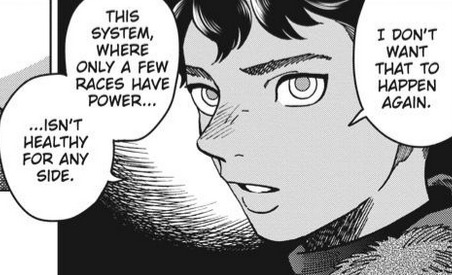

Laios wants to save his sister first and foremost, and it's only along the way that he starts to consider what he'd do with the responsibility of Dungeon Lord. Coming to the conclusion that he wants to create a home for disparate peoples to live in harmony has connective tissue to both Kabru and Marcille's desires.
Marcille is the only one in their party who starts out with a greater motivation other than saving Falin (Izutsumi is a special case, but she's ultimately along for the ride), one that she keeps hidden for a long time. Because she is a mage, and because she is driven by a very personal tragedy (my dad died; I am terrified of outliving everyone), she is looking for a miracle to bring the different races closer together.
Kabru comes from a background of personal tragedy as well, but it's also a far greater, more political tragedy than just the death of a parent. It is not a coincidence that Kabru is a brown boy from an exploited region that suffered despite and because of military intervention from a first-world power, nor that he was adopted by a white woman whose coddling/dehumanization of him represents the paternalistic oversight of these world powers.
Thus, Kabru's motivations are both personal and political: if they, the short-lived races, can finally access the secrets of the dungeons, then not only can they have agency in stopping tragedies like Utaya's, but it will also give them a greater power of self-determination.
Marcille and Kabru have both correctly identified and set themselves against a problem that is greater than saving the life of one girl, greater even than sealing this one dungeon.
Despite Marcille's hopes, there is no grand magic solution to this. Only small, slow, backbreaking, ordinary solutions, the kind you labor over in kitchens and bedrooms and throne rooms and meeting houses and hearths and negotiation tables. The kind you run a kingdom with.
There is a reason why Dungeon Meshi ends with Marcille and Kabru on either side of Laios's throne.
Okay: back to Kabru (under the cut).
I've talked about this a little before, but I'll reiterate here: I consider Kabru to be the counterweight to the back half of the story. In a very literal sense too, as he pulls the focus up from the depths to the surface not once, but twice. Dungeon Meshi builds itself on the premise that the traditional "dungeon" must function as an actual ecosystem, and the monsters in it are biological actors in that ecosystem and not merely magical obstacles independent of their environment. The first couple dozen chapters are focused on this. Like regular animals, monsters have needs and instincts and unique behaviors, and they can be killed and consumed as part of a food chain.
And then Kabru comes along and he reminds us that humans are also part of their own special ecosystem, with their own needs and instincts and unique behaviors, and that beyond the biological drive of the literal food chain there are also complex social issues influencing these behaviors (like capitalism). Tansu's visit with the governor introduced us to these ideas, but Kabru is the one who carries them.
The way he and his party break down Laios's party also serves an important function. I think most readers are so busy being shocked that Kabru is "so wrong" about our goofy boy Laios that they don't realize that he isn't actually wrong about anything (he's only missing the context of what drives Laios, which he admits to and is part of the reason why he pursues him). We've gotten only Laios's view of things so far, and Laios is pretty tunnel-visioned. The narrative, through Kabru, is telling the reader this is how our protagonist actually comes across to his community.
We like Laios because we are following his story from his inner circle. We know he's naive and struggles with people but that he has a good heart and is ultimately just a big silly guy who won't harm anybody if he can help it. But we only know that because we're seeing him with his inner circle, in his environment. Outside of the dungeon, Laios is anti-social to the point of rudeness; he misreads situations and misjudges people, he acts in ways that cause friction, and he accidentally aligns himself with people who make his whole enterprise look suspicious: a prominent half-foot community leader, a mysterious foreigner literally surrounded by spies, the disgraced daughter of a criminal who now has to shoulder the burden of her father's reputation, and an elf in a land where there are no elves. And they seem to be very good at what they're doing. Yet this whole time, Laios acts as if he doesn't care about profit or taking the kingdom, the only logical reasons why anyone on the Island would gather up such a party and throw themselves into this death pit day after day.
Yeah of course Kabru finds this suspicious and interesting. Of course people don't know what to make of Laios. This all reiterates the question that Zon the orc already raised: What will you do, Laios, if you defeat the Mad Mage? If you gain control of all of this? Can you be a leader? Laios himself doesn't know yet.
This is all necessary context for our protagonist and the journey he has to go on, and it's fittingly brought up by the most socially adept character, who is so concerned with human ecosystems and the bigger picture of the dungeon. There is a reason why Kabru, as a character, is connected to large webs of people as he moves throughout the narrative: his own party, Toshiro's party, the Canaries, the denizens of the first floor of the dungeon.
Kabru is responsible for bringing Toshiro down to Laios's party. Toshiro is not a big mover and shaker in the story itself, but his confrontation with Laios is a huge part of Laios's character arc. His detour down to the lower levels also allows Izutsumi to escape and join Laios's party later.
We also have this very important moment:
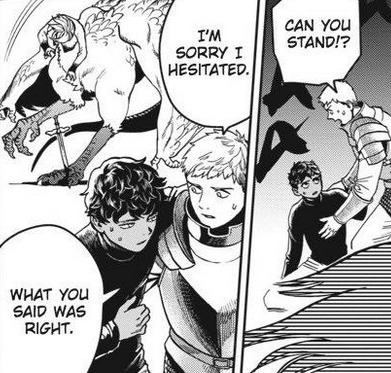
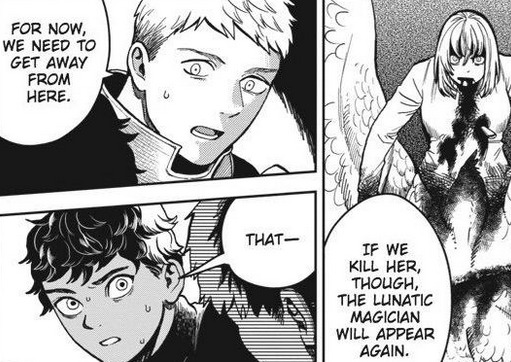
It shows the first inkling- to the audience, to Kabru, and to Laios himself- that Laios is willing to do a painful, necessary thing to protect other people, that he won't just allow them to become collateral for his sister/monsters. That he can listen, and that he can assess a situation beyond his personal feelings. Again, fittingly, big-picture-thinker Kabru is the catalyst for this.
And then, not content to leave him as merely a device for Laios's character growth, the focus slingshots back up to the surface, and we follow Kabru.
The Canaries were going to go into the dungeon soon anyway, and they were always going to stir up the crowd in order to lure Thistle to them. Unless Thistle had given up right then and managed to slip away, the story could have very easily ended here:
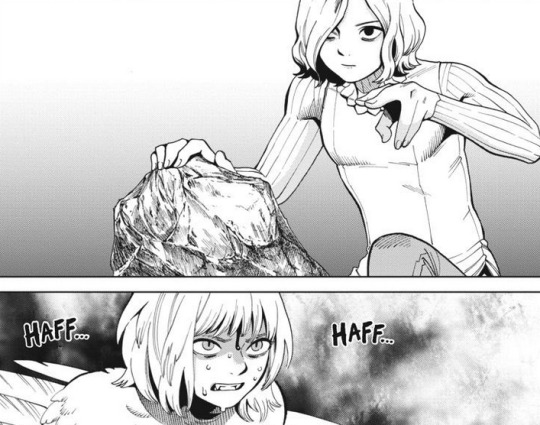
Falin, immobilized and surrounded by Canaries, would have certainly been killed, and there would have been no way to ever resurrect her. Thistle would have been neutralized. The dungeon would have been taken by the elves, and anyone they could get their hands on would have been imprisoned at best. And maybe the dungeon would have been managed safely ... or maybe something would have gone wrong, and more lives would have been lost. Remember: the Canaries arrived in Utaya one year before the tragedy.
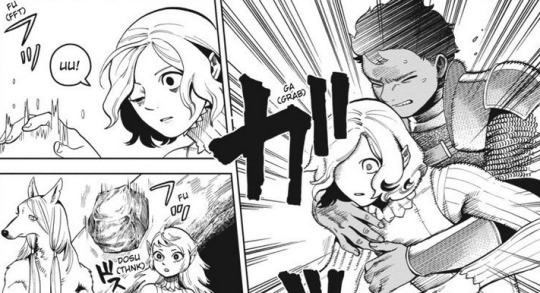
This is a huge moment that changes Laios's life forever, and he doesn't even know it. Kabru single-handedly keeps the story on course by sabotaging the Canaries, and he does it not just for Laios's sake, but for everyone's sake. For his friends and companions in the dungeon and everyone else outside it. Laios is a part of his motivation, a key player in Kabru's hopes, but Kabru has his own desires, his own agenda. He's trying to change the world. In a way, he succeeds. And while the Canaries might wish it were otherwise, as an entity in the narrative they are always anchored to Kabru's character. The two forces collide because of Kabru. The unsealing of the Winged Lion and Marcille's emergency ascension to Dungeon Lord happen indirectly because of Kabru.
While I have talked so much already that I don't want to give a detailed breakdown of it, I do want to mention Kabru's unique interiority as a character. That is to say: we see the inside of Kabru's head more than anyone else. Every character in the main ensemble gets their own moments of inner monologues or fifteen minutes in the limelight, but for Kabru, it's constant. He's always thinking, talking, narrating. His POV chapters always stand out for how first-person they feel compared to most others.
Notably, the only other character I could compare that to is Marcille, specifically during the dungeon rabbit debacle and her ascension afterward, which is when she really takes center stage as a character.
I hope I've explained my reasoning without becoming too insufferable.
To cap off my thoughts with a nod to my original post, I cannot stress enough how significant it is, thematically, that Kabru's relationship with food is the inverse of Laios's. It isn't just that Laios is the main character in a story about cooking monsters and Kabru happens to be his monster-hating foil. The artistic choice to deny the reader the visual of this character ever enjoying food, and only ever putting it in his mouth in situations where it hurts him, in a manga that gives so much attention to eating and the pleasures of meals, cannot be understated.
#Dungeon Meshi#Marcille Donato#Kabru#Kabru of Utaya#Dungeon Meshi meta#Dungeon Meshi spoilers#I started answering this at 10:30 AM but took several detours#mostly I was at work. some people shitpost at work. god knows what I'm doing.#I am so fucking sorry I did not mean for it to be this long. I had to EDIT THIS DOWN#paging malewifesband I feel like this does the trick wrt: Kabru's function in the narrative#of course I have more to say about he and Laios specifically (she threatened)#musings with Dea#I think I'll go back and add image descriptions but it's been eight hours and I need dinner!#and also to play FFXIV#dungeonposting
74 notes
·
View notes
Text
Despite the lack of time, Yoo Joonghyuk hesitated. He hesitated while holding tightly to my collar. "…We don't have to hold another funeral, right?"
I smiled because of Yoo Joonghyuk's question. "Even if I die, I will rise again."
"That isn't what I mean."
Yoo Joonghyuk's expression was serious. A high wind blew between me and Yoo Joonghyuk.
I looked at him for a moment before asking, "Do you remember the second scenario?"
The subway of Oksu Station. It was where Yoo Joonghyuk first appeared after smashing everything. He was a cold-blooded regressor who would use whatever means necessary for the results.
Yoo Joonghyuk's calm eyes shook at my words.
Who would've known at the time? Me and this guy, we would actually end up as companions. I hadn't wanted to admit it but now I had to. The things that hadn't seemed possible became reality. I was actually going through the scenarios with him.
That's why I could now say it. Just like I did when I first met him on Han River Bridge. This was the way that suited us best.
"Release your hand and get lost, you damn son of a bitch."
*Screaming*
Hey guys, remember when Heewon and Dokja had that totally random conversation about dating right in the middle of the arc about figuring out who the person Dokja loves most is?
Remember how Heewon said that Dokja's the type of person to want a "fateful meeting"?
#how can this novel be THIS GOOD?#every little clue and character detail is fitting together so perfectly#dokja's constant talk through the entire novel about how much he loves the novel and how both the novel and yjh have been there for him#the literally mirrored 'you sound so fond when you talk about THAT GUY' scenes for both dokja and yjh#the multiple main 'potential loves' not having a proper affection score#now we're calling back to that fateful meeting conversation#THE 'FATEFUL MEETING' THAT HE HAD WITH THE ONE HE LOVES MOST#THE ONE HE LOVES MOST WHO IS YJH BECAUSE YJH IS HIS BELOVED PROTAGONIST#oh man and right in the middle of this very serious fight where EVERYONE IS GOING TO DIE if you don't do something RIGHT NOW#yjh still can't stop himself from pausing just to make sure that dokja will come back to them#orv#orv spoilers#orv novel chapter 178#orv liveblog#omniscient reader's viewpoint#kdj#yjh#joongdok
46 notes
·
View notes
Text

My latest read from the library. I enjoyed it, but while being a fan of golden age Hollywood meant that I got all the references (including the sly Hail, Caesar nod) I also saw the twists coming.
...I was also critiquing things like "would this really have been Errol Flynn's star image in 1944?" so this may prove that I am just on the wrong side of the "insufferably into old movies" spectrum to be this book's target audience.
#also: would errol flynn ever have been the most sober member of a friend group? ever?#windhall#ava barry#it was fun don't get me wrong#i just kept nitpicking#if the protagonist is as seriously broke as he appears to be why is he drinking macallan?#...yes i am also Like That about scotch#book covers#cover design#wait i'm not done: am i supposed to believe that anyone would meet errol flynn and not have SOME internal reaction#to the charisma or the charm or the good looks and/or the dangerous reputation?#to none of it? All Of That shows up and offers the narrator his hip flask and the narrator is... mildly interested?#no man is THAT straight surely#also the narrator later turns out to be an activist (ish) for women's rights#in which case#he never socked flynn in the jaw/gave him the dirtiest side-eye known to man/made a snarky comment?#maybe my conclusion is: one does not simply make errol flynn a background character#queue
19 notes
·
View notes
Text
Ugh I’m sorry I have to say it again but I love Izuku so fricken much
#izuku midoriya#mha#mha rewatch#he’s up there on the list of favorite protagonists#he was built this way but he really is something else. the perfect protagonist for this story#we’re gonna meet so many strong and good people and doesn’t that make it that much better that the strongest and the coolest and the kindest#is the one who started off as the weakest#the lowest#the most overlooked and pitied and bullied#the most heroic character in a story where everyone is a hero is the one who was born without a quirk#ugh I love it so much
14 notes
·
View notes
Text
i feel like the fact that barely anyone who watches the show thinks of will as the main character might be indicative of the fact that he isn't
#and like i say: brf slt#just realized i said the fact twice. this was worded differently at first#i'm very sorry#(not about the the fact thing about the will mc thing)#if you ask anyone who the main character is after seasons 3 and 4 they'll say el#it's not the el show and will is just as if not more important to the supernatural plotline like obviously nothing would've happened if he#hadn't gone missing and he has a connection to vecna no one else has and#everyone's love for him is basically what makes all of s1 happen#but he's literally not there. i've seen people watch the show for the first time recently and guess who was the main character to them#while they were watching the first two seasons? mike! literally elliott in E.T and the YA protagonist in the middle of a love triangle why#does everyone take his main boy status away from him...we first meet the characters at HIS house in HIS basement we see HIS family first#it's HIM we follow all throughout season 1 in the kids part of the show basically like idk#yes he's not el and he's not will in terms of connection to the supernatural but like#in seasons 3 and especially in season 4 you don't really think of him as the main character anymore but literally no one but bylers think#of will as the main character like i'm just saying. i don't think trying to pick a definite main character makes sense anyway because#there's kind of a shift around season 3 where it becomes...the el show. even if it doesn't not really. but it's not like people are crazy#and Media Illiterate for thinking that the biggest character on the posters whose actress is the biggest star and who gets paid the most is#the main character. don't people complain 24/7 about how little screentime will got in seasons 3 and 4 like obviously that would lead to#people...not seeing him as the main character#anyway. to me in seasons 1 and 2 it's between mike and el honestly and if you add seasons 3 and 4 then el#even though will is just as important like i said. it's just very different#but honestly in season 1 it's totally mike to me it's only in season 2 that i would start to hesitate#there's also joyce but i don't think anyone's saying joyce is the main character but yk i don't know if you know this but it's an ensemble#show...#it's definitely the willel show in a sense but...#mike is the protagonistest protagonist in season 1 how do people forget that#having to fight for your life to convince people that will is the main character kind of proves that he isn't😭#and i still think he's the most important which doesn't make sense i know but idk it makes sense to me
25 notes
·
View notes
Text
the nero and airi connection is so important it's not just bcs theyre my faves
#sylhea talks maydare#i swear i made a post abt this somewhere but rn im remembering why them meeting and talking was may fav chapter it's so so important#like look theyre both- in a way- 'taken in' by kanon. kanon chose airi to be the saviour while kanon saved nero bcs he's essential#airi got kanon's 'hero' while nero got kanon's 'king'. one of them feared kanon while the other admires him#and yet kanon is their saviour. he took them away from a world that is cruel to them. yet airi and nero have different circumstances#oh my god wait there's more similarities than i thought#both of them were taken just after their important people had died and in a vulnerable state#airi back thwn had a childish (not meant to be /neg) mind while nero in the past was just a child#both are given a responsibility and both accepted them in different ways. while airi was in the delusion she's the 'protagonist' of maydare#nero understood what his purpose and what he's supposed to do. but also both of them wanted something they desire. they wanted 'peace'.#both of them wanted to be in a world where they can live freely. airi wanted to live the most of her delusions while nero wanted to live#the most of his life as a normal student. different but to its core they only wanted peace and be themselves freely.#and in the end both of them understood that they have to act their role in order to achieve that peace in this worl. they know they had to#face forward and fight.#IT'S THIS LONG AND IM NOT EVEN GETTING INTO WHAT MADE ME START THIS 😭 atp their parallels is the main focus here#so all of those and there's more. makia. their connection to makia.#nero is a friend of makia while airi is a friend of kazuha. and the people who knew about makia's past.#i'm guessing nero only knew makia's past life as the scarlet witch and dont know about her other past life#while airi only knew about makia's past as kazuha and didn't know about her being a reincarnation of scarlet witch#nero talking to airi about makia was also very important bcs yes makia already slapped airi into reality and makia was able to do it#bcs not only is she born and raised in maydare she also have memories of the other world. nero who is PURELY from this world and donxt know#about the other world helped airi accept that this IS an actual world. makia ACTUALLY lived in this world and she learned that from nero.#lmao i know that wasnt the intention bcs the intention was nero saying all that so there's proof makia really is the reincarnation of makia#but i'm already this far bro nero who's purely from maydare that came to know of the other world from someone else#and airi who is purely from the other world and isekai'd by someone else to maydare#it's so fascinating#god when this chapter comes to manga im hoping ppl dont immediately ship them#bcs to be honest i dont think airi is interested in men at all and nero is interested in romance in general#plus nero is 16 y/o while airi is 20 y/o so there's that LMAO#it's so insane to me how much damage airi actually had her experiences was actually REALLY traumatic
8 notes
·
View notes
Note
who is your favorite one piece character. *staring intently no pressure no pressure no pres (´灬⊙ω⊙灬`)♡
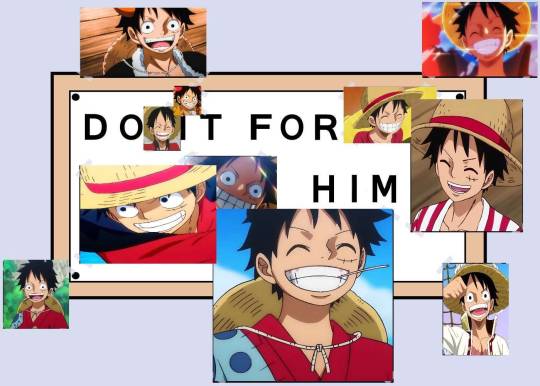
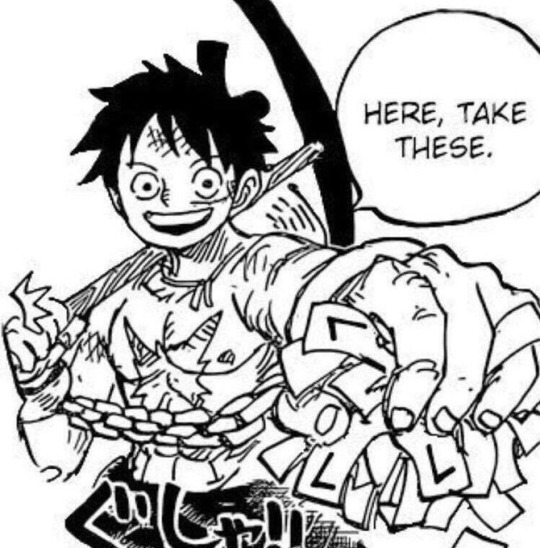
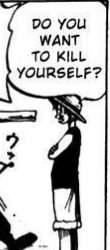
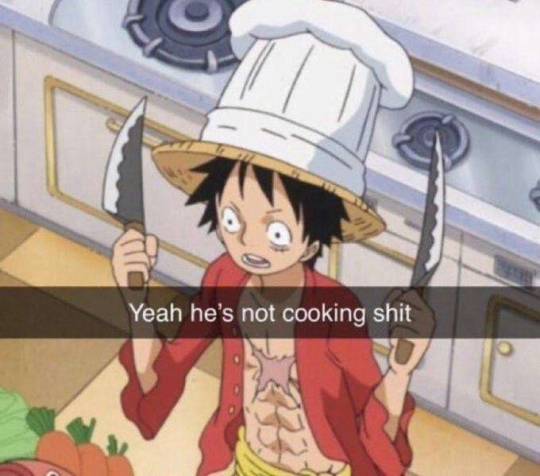
Idk some fucking guy that showed up on screen for a bit he was kinda cool
#luffy is a character that i feel everybody including the viewer is meant to kind of underestimate at first#to chalk him up to a naive fucking idiot that's gonna get himself killed by something more powerful because he overestimated himself#you keep waiting until he bites off more than he can chew#yknow you wait until he finally meets that match that makes him hesitate and think ''i'm not strong enough‚ i need to improve''#like so many shonen do nowadays where the main character gets humbled by someone more powerful than the level they're at#but with luffy that just.... doesnt happen#no matter how fucking awful and horrifying the series gets sometimes and how high the stakes rise with more genocidal villains#luffy acts as the humanized force of unshakable freedom that cant be silenced for good#luffy is a protagonist but he is also an all-encompassing metaphor that seeps from every pore of the series#and i feel extremely strongly about what he represents and the way he can change YOU and make u feel the hope u thought u lost#he is a character but he is most importantly a vessel for a story that‚ at heart‚ wants you to laugh and dream and love unabashedly#he is not a mascot lil shonen protag created for the sake of telling the viewer ''killing bad! friendship important!''#that motherfucker is built to inspire you to be shamelessly happy to fucking live and laugh and dream big idiot dreams#its hard to describe what he fucking Does to your brain to people used to consuming trash anime with basic niceguy protags#but luffy isnt just a protag. he is a feeling that you learn to adopt. but the depth of that cant be described until you feel it#its a shame people get so scared of the episode count because theyll never experience one of the most soul-changing series ever made#luffy is just one guy in a series full of characters so nuanced and fleshed out they could have their own damn shows
4 notes
·
View notes
Note
okokokok i raise you teresa reading sense & sensibility honestly!!! elinor pushing through grief and loss and hardship with no ability to take up a sword and change her circumstances, and the drama of marianne being taken advantage of for having the courage to love freely…. i think she’d wanna gut mr willoughby tbh!!

Teresa reading any of the JA novels tbh!! But YES S&S is a fantastic one! I think as an older sister too (at least, that's my headcanon- Vivar mentions her sister, Maria, and in the books it's Ramon, so I say Teresa is the eldest child/sister, and I say she has both siblings!) she can really relate to Elinor- she has to take care of her family first, to put her own emotions and heartbreak aside, especially in times of great change and tragedy. She has to be the strong one. Teresa would definitely see herself in Elinor, and though I don't talk about her a lot because there's nothing about Maria in canon and she's basically a blank slate, I think Maria being like Marianne is a great dichotomy between the two.
I always thought of Maria being the baby of the family, so she gets away with a little more than Teresa did- she's also the youngest daughter, and while Teresa probably has a little more pressure to marry well, Maria more than likely doesn't. Maria can be a romantic, to chase after who she wants, though I like to think she's a little more airheaded than Marianne, less bold, but just as excitable. That one scene in the 1995 P&P with Lizzie and Maria Lucas makes me think of their relationship- Teresa guiding and teasing the overly worried Maria. "Mariah, this is your trunk and these are your gowns. You may arrange them in any way you wish- Lady Catherine will never know!" Also that scene where Mariah tells Lizzie to hurry downstairs and does a little spin- that seems like a thing Maria would do! Excitable and fun and so young.
And YES she would want to gut Willoughby for being such a rake and a terrible person!! Especially for knocking up a 15 year old and leaving her to fend for herself!! For the heartache he put Marriane through as well. Teresa understands the economics very well and knows that love sometimes isn't enough to make a relationship work- money is just as important. But it doesn't stop her from breathing a sigh of relief when Marianne dodges a bullet when he leaves her. Sam and I like to think Sharpe gets P&P for her and they read it together, and when they go to Yorkshire and meet a George Wickham they look at each other like 😳😳😳 mr willoughby and wickham found dead more news at 11
#;letters#(i just got finished listened to a reading of s&s so this was perfect)#(although of all the jane austen novels teresa reads i will be biased. i think persuasion is her favorite)#(because its the most mature of her novels- anne is older than any other protagonist. and teresa is a romantic and LOVES romance novel)#(especially in her youth though i think she tries to hide it/deny it but by the time she meets/marries sharpe she can indulge in it ;w;#(but i think she enjoys anne's maturity and how brave she is in the face of longing and heartbreak and yearning)#(8 years!! 8 years since she's seen the man she loved- the man she never stopped loving. it might not have been 8 years)#(but teresa understands that longing of missing someone you love dearly- someone gone off to fight- not knowing if youll see them again)#(all too well)#(one day i'll write out the moreno family dynamic i have most of it in my head as well as family fancasts....)#(also ty for your patience!! ill answer your next ask asap <3)
6 notes
·
View notes
Text
really and truly the tiers of mob saiko understanders are That One Blog That Translated Ch 100 As It Came Out > the privileged few who like teru/mob > people who hate teru/mob > most people who like teru/mob > people who call reigen gendered slurs
#kelsey liveblogs mp100#teru is one of those guys i feel so proprietary of and the things that to me are most compelling about him is his ability to recognize#the existence of a story and his role in it and manipulate that to change his standing.#that's all tied up 1:1 in his relationship with mob-the-protagonist#consequently i also love mob's relationship with teru because it's the one thing that consistently puts mob off balance.#even at the end teru brings out the 'worst' parts of mob.#so i like to think that the importance of their first meeting/the reversal at their last meeting/their status as peers#means that they've got intense enough feelings tied up in each other to have that simmer for years and eventually become unavoidable#hhhhhhhhowever the default interpretation of 'oh cute kiddo with a crush' while giving me nice fanart is missing the point by a mile#i am sitting on a grassy outcrop eagerly consuming the fan content passed to me from within the cave where people are watching the shadows#tbh. i shouldn't be complaining
2 notes
·
View notes
Text
Intitally struck me odd that the 3-note relationship indicator popped up over the Protagonists head from the simple act of Venam giving them a soda (unless of course it was a visual bug, been having a few of those, and in that case this whole post is moot). Because well, generally the relationship icons doesn't appear for your character, just the other characters in response to your actions/words.
Then I kinda realized there aren't really many moments where other characters just kind of regard you casually. Most cutscenes, other characters frequently tend to mention how strong the protagonist is, or how helpful or heroic they've been. Definitely there's been moments of genuine concern of course, especially after Nancy's death with everyone being worried, and later on Melia asking and making sure they're okay, but generally any conversation that directly mentions or includes the protagonist tend to lean more towards their capabilities then them as a person (alas the downsides of being a silent protagonist sometimes)
So I guess in the eyes of the protagonist, not the player, they're touched they were considered outside of their heroism or strength. And on that note, Venam is also probably the character who you interact casually with the most with surprisingly (Aelita gets pretty close or the same though, since there's a solid period of the game where the two of you are traveling together). Ya know just kind of hanging out or eating food and whatnot and at least having some time NOT directly worrying about Team Xen or Psychic Nukes or hostage situations and whatnot
#also i definitely feel venam is one of the better developing relationships with the protagonist#not sure why but considering the games taken place over a few months i feel they're the most natural friendship#and part of that's definitely how in the first half their meetings are more scattered before interacting a whole lot more in tarujama#lemon plays#pokemon#pokemon rejuvenation#pokemon rejuvenation spoilers
5 notes
·
View notes
Text
I've been thinking a lot lately about how Kabru deprives himself.


Kabru as a character is intertwined with the idea that sometimes we have to sacrifice the needs of the few for the good of the many. He ultimately subverts this first by sabotaging the Canaries and then by letting Laios go, but in practice he's already been living a life of self-sacrifice.
Saving people, and learning the secrets of the dungeons to seal them, are what's important. Not his own comforts. Not his own desires. He forces them down until he doesn't know they're there, until one of them has to come spilling out during the confession in chapter 76.
Specifically, I think it's very significant, in a story about food and all that it entails, that Kabru is rarely shown eating. He's the deuteragonist of Dungeon Meshi, the cooking manga, but while meals are the anchoring points of Laios's journey, given loving focus, for Kabru, they're ... not.

I'm sure he eats during dungeon expeditions, in the routine way that adventurers must when they sit down to camp. But on the surface, you get the idea that Kabru spends most of his time doing his self-assigned dungeon-related tasks: meeting with people, studying them, putting together that evidence board, researching the dungeon, god knows what else. Feeding himself is secondary.
He's introduced during a meal, eating at a restaurant, just to set up the contrast between his party and Laios's. And it's the last normal meal we see him eating until the communal ending feast (if you consider Falin's dragon parts normal).
First, we get this:
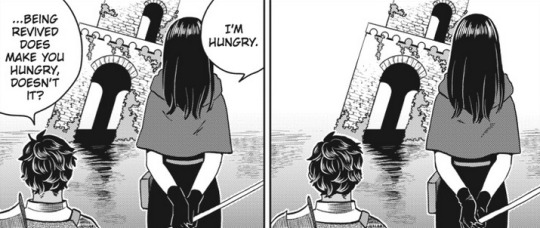
Kabru's response here is such a non-answer, it strongly implies to me that he wasn't thinking about it until Rin brought it up. That he might not even be feeling the hunger signals that he logically knew he should.
They sit down to eat, but Kabru is never drawn reaching for food or eating it like the rest of his party. He only drinks.

It's possible this means nothing, that we can just assume he's putting food in his mouth off-panel, but again, this entire manga is about food. Cooking it, eating it, appreciating it, taking pleasure in it, grounding yourself in the necessary routine of it and affirming your right to live by consuming it. It's given such a huge focus.
We don't see him eat again until the harpy egg.
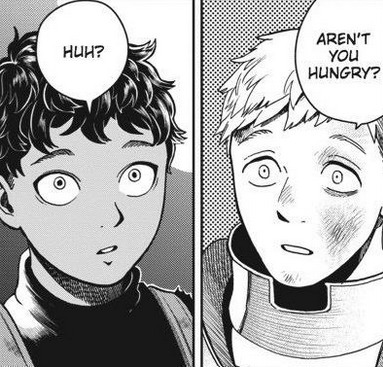
What a significant question for the protagonist to ask his foil in this story about eating! Aren't you hungry? Aren't you, Kabru?

He was revived only minutes ago after a violent encounter. And then he chokes down food that causes him further harm by triggering him, all because he's so determined to stay in Laios's good graces.
In his flashback, we see Milsiril trying to spoon-feed young Kabru cake that we know he doesn't like. He doesn't want to eat: he wants to be training.


Then with Mithrun, we see him eating the least-monstery monster food he can get his hands on, for the sake of survival- walking mushroom, barometz, an egg. The barometz is his first chance to make something like an a real meal, and he actually seems excited about it because he wants to replicate a lamb dish his mother used to make him!
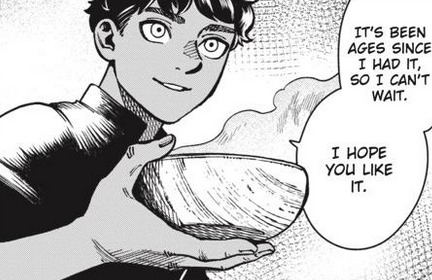
...but he doesn't get to enjoy it like he wanted to.
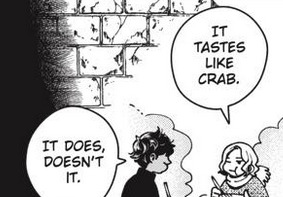
Then, when all the Canaries are eating field rations ... Kabru still isn't shown eating. He's only shown giving food to Mithrun.

And of course the next time he eats is the bavarois, which for his sake is at least plant based ... but he still has to use a coping mechanism to get through it.
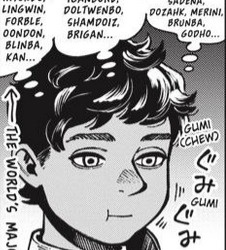
I don't think Kabru does this all on purpose. I think Kui does this all on purpose. Kabru's Post Traumatic Stress Disorder should be understood as informing his character just as much as Laios's autism informs his. It's another way that Kabru and Laios act as foils: where Laios takes pleasure in meals and approaches food with the excitement of discovery, Kabru's experiences with eating are tainted by his trauma. Laios indulges; Kabru denies himself. Laios is shown enjoying food, Kabru is shown struggling with it.
And I can very easily imagine a reason why Kabru might have a subconscious aversion towards eating.


Meals are the privilege of the living.

#Dungeon Meshi#Delicious in Dungeon#Kabru#Kabru of Utaya#Laios Touden#Dungeon Meshi meta#you can have him in the tags too. as a treat.#Dungeon Meshi spoilers#this was directly inspired by livelaughlaios's post about Kabru self harming but I decided it got too long to make it a direct reply#this is a theory I've been working on for weeks because I kept noticing this while skimming for screencaps#I'm hesitant to trigger tag this because of the way certain subcultures on tumblr operate#but if anyone needs me to add a content warning please let me know#also I included image descriptions! I did my best#I think they even help illustrate my points but my god were they sad to write. Kabru is so fucking sad you guys#musings with Dea
12K notes
·
View notes
Note
Don’t know if you’ve already answered a question like this, but what is your opinion on the rise of meta stories in the general media space? Stories that tackle the nature of the story they’re telling or do/don’t do a trope while aknowledging that it sure is a trope that is used in stories.
In the year 1615, Spanish author Miguel de Cervantes published the second part of what had become his most well known work, the novel Don Quixote. Though its plot ranges widely, the premise of this second volume involves, in part, the tale of the protagonist's earlier adventures having been published in book form (possibly by a wizard), resulting in several encounters in part two with characters who've read part one – in effect, the novel Don Quixote exists within its own text.
At one point, the titular Quixote meets a man named Don Alvaro Tarfe, a character from an unauthorised Don Quixote sequel published by a rival author; though Tarfe claims with seeming sincerity to be a great friend of Quixote, he does not recognise the man standing before him now, apparently having befriended a different version of Quixote in his earlier travels. This episode frames a metafictional commentary on the idea of literary canon and the notion of "authenticity" in authorship.
2K notes
·
View notes
Text
Trigun fucking destroys me, okay.
It's about persisting through the most horrific obstacles imaginable, and never losing hope for yourself and others. It's about the fruit your efforts bear, but it doesn't ignore the ugliness of the suffering you endure. It doesn't sweep it under the rug to give you a happy ending.
As a jaded millennial, I get a bit tired of stories where everything turns out fine because the heroes tried hard. Most stories gloss over the repercussions of failure. They tell us it's all simply a means to an end, and that end is what matters. Overcoming your obstacle matters. Winning matters.
Trigun doesn't do this.
Vash gets hurt (gross understatement). He's ostracized, bullied, threatened, haunted, forced to see the darkest underbelly of humanity. He's subjected to the worst parts of life that are grotesquely ruthless, unforgiving, hopeless. He's forced to reconcile a lot of his goals (like never killing anyone), but not the core of his beliefs.
Not once does he falter in his trust that people are capable of good, that we all deserve that chance to be. He never has a revelation that shakes his faith in humanity, despite constantly being given every reason to. He's the irritatingly optimistic anime protagonist who looks at impossible odds and says "everything will be alright", the way no one can in real life because it never works out that way for us.
And it doesn't for him, either.
Vash does his best, believes in himself, and fails. over and over and over again. He loses everything--loved ones, memories, autonomy. He loses constantly. He's your unrealistically positive hero, being dealt realistically unfavorable hands.
And still, he persists. He never truly wins. Because we never truly win. Life has no happy ending like a story does.
He never truly wins, and yet, he can still find happiness. He meets friends, enjoys good food, watches people love fiercely in both blessing and hardship. He hits unbelievable lows that don't keep him from finding highs. Because he never stops trying to be the best of what he sees in humanity. Because every little bit counts. He never stops believing in humans--believing in you.
Trigun grabs you by the face and stares directly at you. It says "I see you, I see your pain, how much you struggle. I see how sometimes no matter how hard you try, things don't work out. Life isn't a fairy tale. I see how your kindness can come back to hurt you, hurt others. I see you, and I'm proud of you. Life is worth living with love in your heart not because we win, but because we try. We all try. Never stop trying to be kind."
Trigun shows you the cruel reality of life, and leaves you feeling good about it.
I don't know a single piece of media that's able to do that.
#trigun#and personally i love that Trigun Stampede really amps up his superhuman qualities#like hey#if a guy that's LITERALLY on par with a god can fuck up this badly#then you don't need to beat yourself up for your failures#don't look at me I'm emotional
4K notes
·
View notes
Text
I am 40% of the way through Gideon the Ninth. There are no plot spoilers below.
What is refreshing about Gideon as a protagonist and POV character is that she is a jock. She fundamentally does not care about all this nerd shit going on, i.e. the entire setting and plot. She misses exposition, background, and other explanations because, as one person who starts explaining how magic works observes, "right, you're not even pretending to pay attention."
Most writers are writers, so this is not a common perspective for a book to hold. Plot-relevant details can be sprinkled freely because Gideon's narrative will see them and not even shrug before moving on.
GIdeon lacks the emotional and mental maturity to be a good person. She is not evil as such, just apparently unaware of the existence of moral implications. When we meet her, her motivation is to get out of this hick town and join the military, because fighting is glorious and cool and this hick town sucks. She likes weapons and fighting and working out and hot chicks. She fantasizes about leading military charges that bring death to new worlds and fuel necromantic rituals because that would mean hot goth babes would see how cool she is and be grateful. She does not dwell on the thought of worlds that apparently have never known death and her plan to look cool leading imperial invasions and killing enough people to fuel necromantic rituals. She does dwell on the thought of that prissy bitch from her high school having to see how cool and hot she is now that she's a war hero who gets medals and hot babes.
You as the reader can be carried along very quickly by this incurious perspective that does not think twice about things. You as the reader may want Gideon to backtrack and dwell on something or explore it further. The weirdness of the setting is more or less swept under the rug by Gideon's not noticing it. 98.5% of the children on a planet gone (died?), but Gideon doesn't devote a second sentence to boring backstory like that. What was that about galactic conquest, in a setting where the main weapons are swords and necromantic magic? How little advancement has there been in technology or magic in 10,000 years, despite a possibly continuous civilization that whole time? Or some references to what sound like dark ages? Damned if Gideon cares or even notices.
The necromancers are dying to talk shop about their powers. Gideon rolls her eyes and wants to talk to that woman about the cool flip she did, because Gideon wants to look cool doing flips during fights and have girls notice how cool she looks. Also her biceps. Gideon cannot pay attention for a full sentence on necromantic magic, but she does have a half-page to dwell on girls noticing how big her biceps are.
8K notes
·
View notes
Text
none of you are ever going to read this fic, so i can spoil the first big twist because i’m looking forward to the utter betrayal:
the first viewpoint character, who you’re introduced to as the protagonist, is a fake-it-til-he-makes-it nervous wreck who doesn’t even want to be here but has no other way to get his search and rescue license, after finally starting to gain some confidence and feel that he measures up to his classmates, dies brutally saving a fellow student’s life, and rather than let him rest, the villains desecrate his corpse and turn it into a weapon for no other reason than to torment his friends
#Blue Jay Chirps#My OCs#ask to tag?#he doesn’t even want to be a hero#villains are terrifying and he’s only a kid#he just wants to do urban search and rescue but you need a hero license for that#which means training and villains and a teacher who’ll just expel him if he fails to meet his incredibly exacting standards#everyone else seems to be handling it well but he feels like there are people who were passed up in the entrance exam#because their quirks weren’t good for fighting who deserved his spot more than he ever could and it’s hard to get over that#but his classmates notice him falling behind and go out of their way to make sure he can keep up even if he’s scared#so maybe this hero thing can’t be all bad right? if they think he can do it he should at least pretend he wants to be here.#and suddenly he’s not pretending anymore; he wants it just as much as them#so when villains attack their camp he’s fighting alongside the rest of them to make sure everyone stays safe#but one of them has a gun and the ricochet goes right through his liver#except he doesn’t even really register the pain because suddenly someone *screams* and he’s running before he can think#he keeps them from suffocating but suddenly the world is tilted and it’s hard to figure out which way to run for help#he bleeds to death in his teacher’s arms laughing hysterically about how he never wanted to be a hero in the first place#essentially you’re introduced to him as the protagonist but he’s just a decoy to set the tone/establish how *fucked* society is#i say none of you are going to read it because i doubt most of my followers are in this fandom#and it’s gonna take me quite a while to get to where i can post anything for it
1 note
·
View note